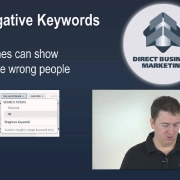Am I Indexed? How to See Your Pages
Hello, my name is Andrew Houglum with Direct Business Marketing and today we are going to do a screen capture video on how to check to see if your site is indexed by Google. Google has a number of keyword codes that you can use in the search bar and it will return specific results. For example, to see how many pages are indexed, you can you click the word site and then a colon and then your domain without any www’s in front of it. So this is a domain that we have owned for a while but we haven’t really done anything with as of yet. It is Business Marketing TV.com. So as you can see there are no pages indexed for that domain. Here is another search for a domain for a client that we created. It is a free mlssearch.com. As you can see there are about 36,000 pages indexed by Google and they are all listed here. Another thing you can do with this is You can put a key word after this for example Scottsdale and see all the pages that are indexed under the Scottsdale keyword for my website. So it’s kind of a handy trick you can use in Google to check out how many pages you have indexed. So that’s it for today. Here is my contact information: 602-571-5803, and my email is [email protected]. I wanted to direct you to our marketing assessment. Go directly to https://directbusinessmarketing.com/MA for marketing assessment. Download it today.

